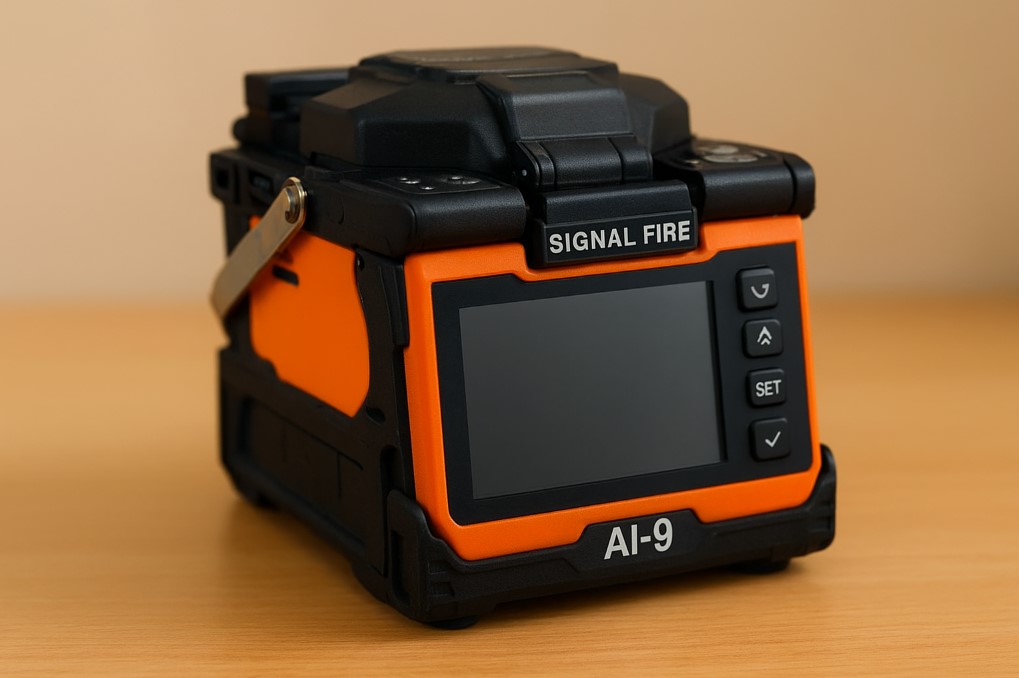Nobody Knew What to Call the Signal Fire Fusion Splicer, Until We Stepped In
Chinese are the OGs of brand confusion, and it’s not always easy to know what to call most of their products.
This stems from a long-held government policy that prioritized resource deployment into core product R&D and mass production, while marketing and brand identity were left as an afterthought.
The result has been an influx of highly specialized equipment that often arrives in new markets with unclear branding, inconsistent naming, and little to no usage documentation.
For dealers, resellers, and end-users alike, this creates significant challenges.
Operating, maintaining, and even identifying the right equipment becomes complicated, often leading to safety risks, troubleshooting headaches, and parts replacement issues.
In growth markets like Kenya, where emerging tech-driven sectors depend heavily on Chinese gear to scale, the problem is even more pronounced.
Dealers and ISPs shoulder most of the burden, while end-users face longer learning curves just to get the technology working reliably.
This has been a recurring reality in the internet infrastructure sector, which relies almost entirely on Chinese hardware to deploy and expand fiber connectivity.
Yet amidst this backdrop of confusion, one product’s story stands out.
👉 Today, the Signal Fire AI9 Fusion Splicer is a trusted name in Kenya’s fiber industry.
But just a few years ago, it was a mysterious “orange splicing machine” clouded by doubts, high costs, and misinformation.
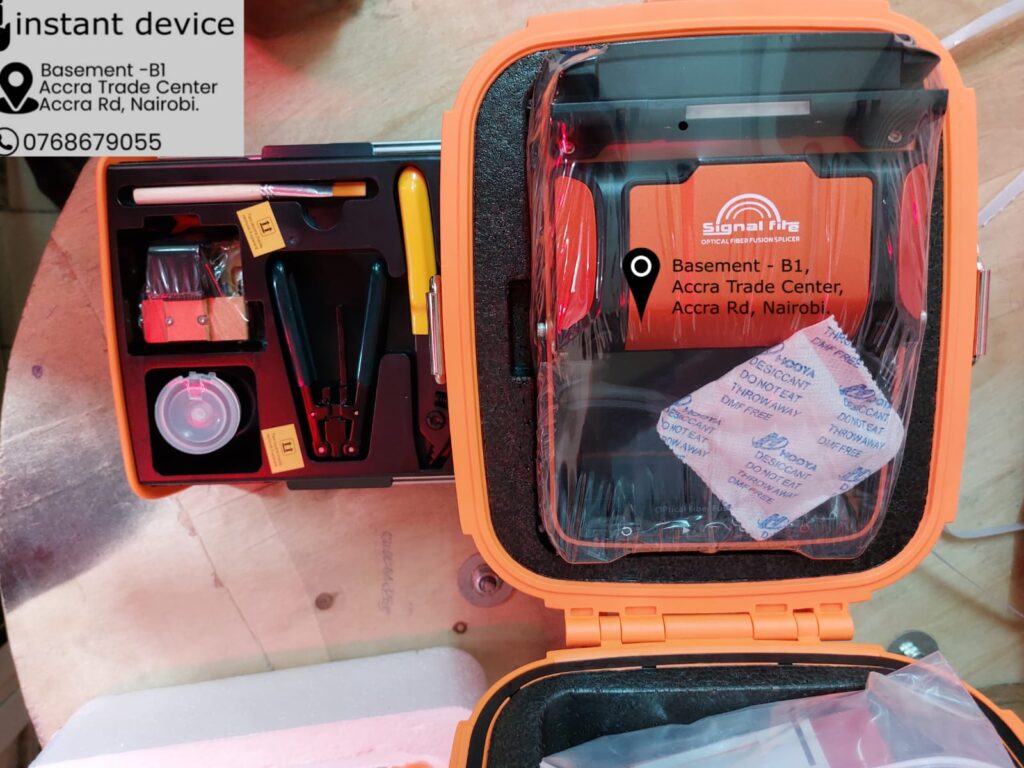
This is the story of how Instant Device helped change perceptions, connected ISPs with trusted technicians, and built confidence in the brand, turning Signal Fire into a household name in Kenya’s fiber optics industry.
The Era of Doubts and Hires
- Back in 2021, most ISPs in Kenya were hesitant to buy fusion splicers. Instead, they hired technicians who had invested in the AI9.
- A single fiber core splice was going for KES 1,000 – 1,500 in 2021. When you do the math, a pair of electrodes (good for about 5,000 splices) meant a technician could generate KES 5 million to 7.5 million from one pair of splice electrodes.
- Many ISPs assumed the machine was obsolete after 5,000 splices, not knowing electrodes could be replaced affordably, for as little as KES 7,500 in 2021 and 2022.
- At this time, the machine was selling for around KES 150,000, and for many ISPs just getting started with fiber-to-the-home (FTTH) rollouts, this was seen as a risky investment.
👉Instead of buying, most ISPs chose to hire splicing services from technicians who had positioned themselves to own and lease out the AI9.
But as you have seen above, hiring wasn’t cheap.
The high cost of outsourcing made fiber projects expensive and unsustainable for smaller ISPs.
2022 – The Confusion of Names
People didn’t know what to call the AI9. It was “A9,” “Signal something,” or simply “the orange machine with the box showing a man on a stool.”
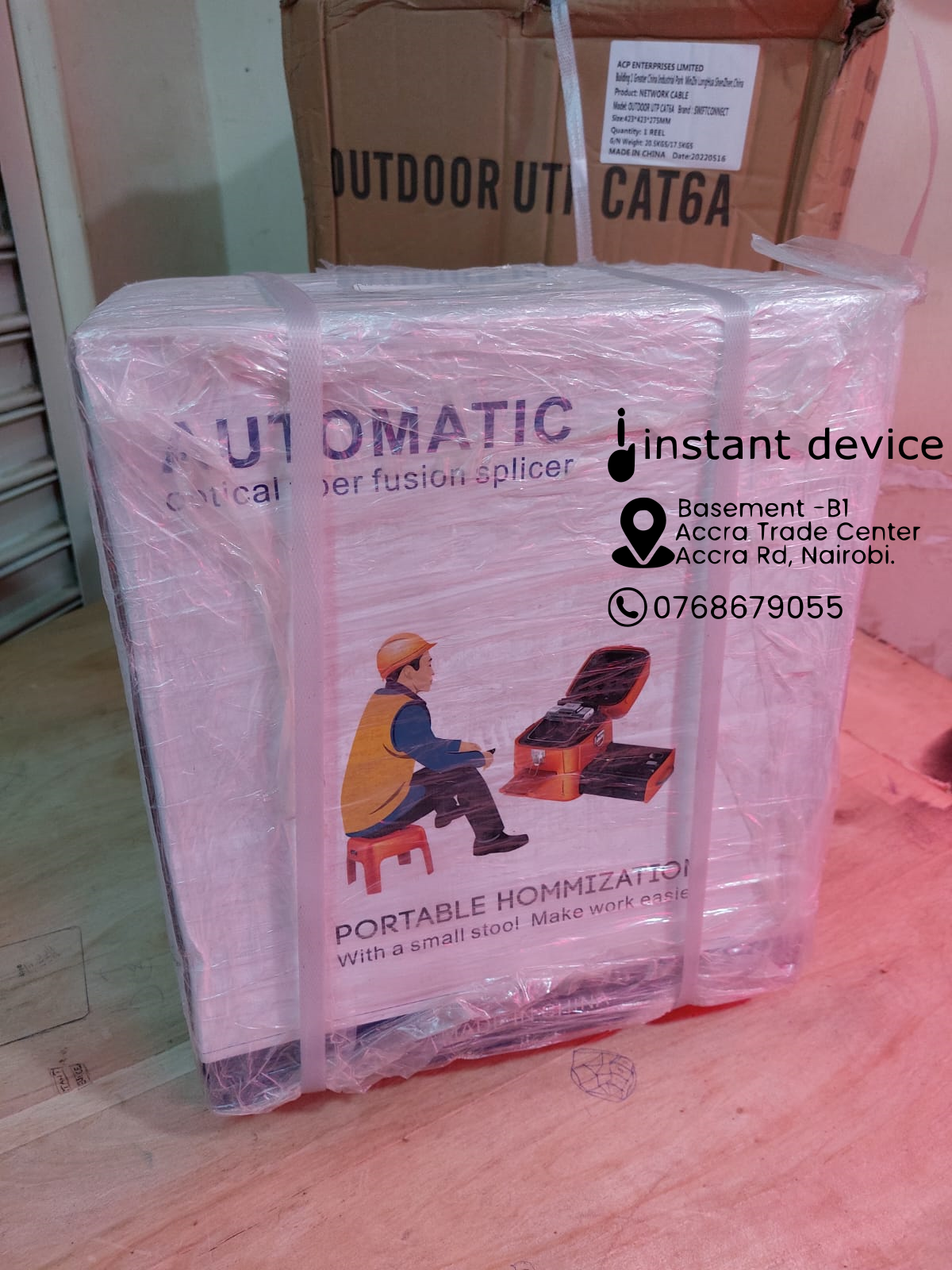
This was the year when much of the confusion was addressed.
At Instant Device, we decided to standardize the name: Signal Fire: Model AI9 Fusion Splicer
Our Jiji adverts, product listings, and customer support consistently used this naming, and soon, ISPs began asking for “Signal Fire” instead of “that orange machine.”
💡 Fun Fact: Instant Device was at the forefront of popularizing the name “Signal Fire” in Kenya.
Clearing Gray Areas and Building Trust Through Support
Beyond the Signal Fire brand confusion and skepticism, we tackled one of the biggest hurdles ISPs faced after buying the splicer.
That was servicing and repair.
Nairobi had and still has only one company that can service the AI9 properly, and finding them was a real hassle.
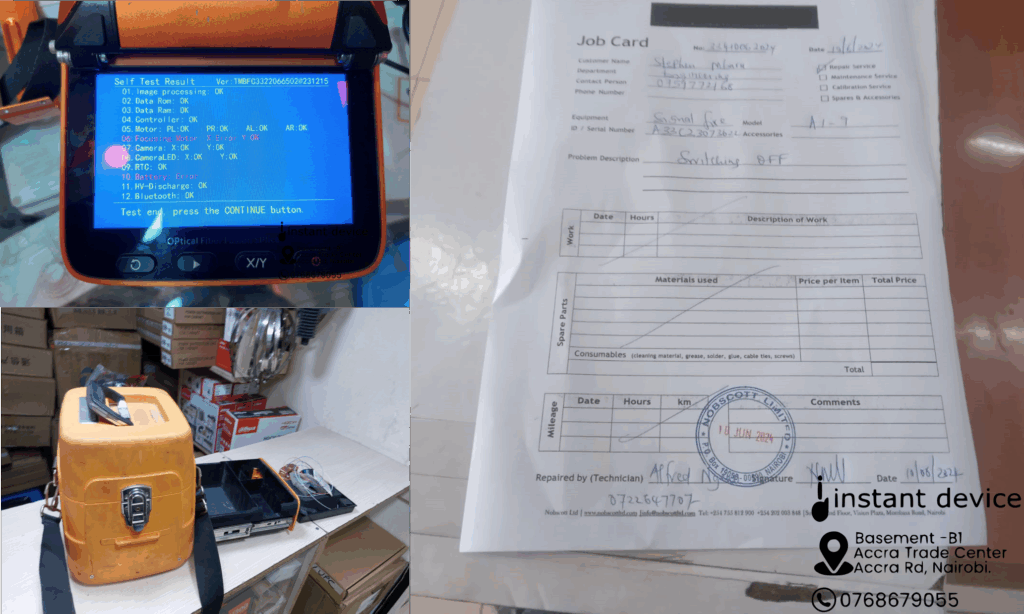
We also introduced a unique troubleshooting loop that involved comparing what User A reported with what Users B & C experienced, then relaying the findings back into the ISP community WhatsApp Groups.
Most of the solutions came from working closely with technicians who were not just owners but daily users of the AI9, which made the troubleshooting practical and effective.
👉 This open, community-driven support network helped resolve issues faster and made customers feel more secure about ownership.
Breaking the Electrode Myth
One of the turning points was dispelling the myth of obsolescence.
By proving that electrodes could be replaced affordably, at KES 7,500 in 2022, we erased the fear that the AI9 was a “use-and-throw” machine.
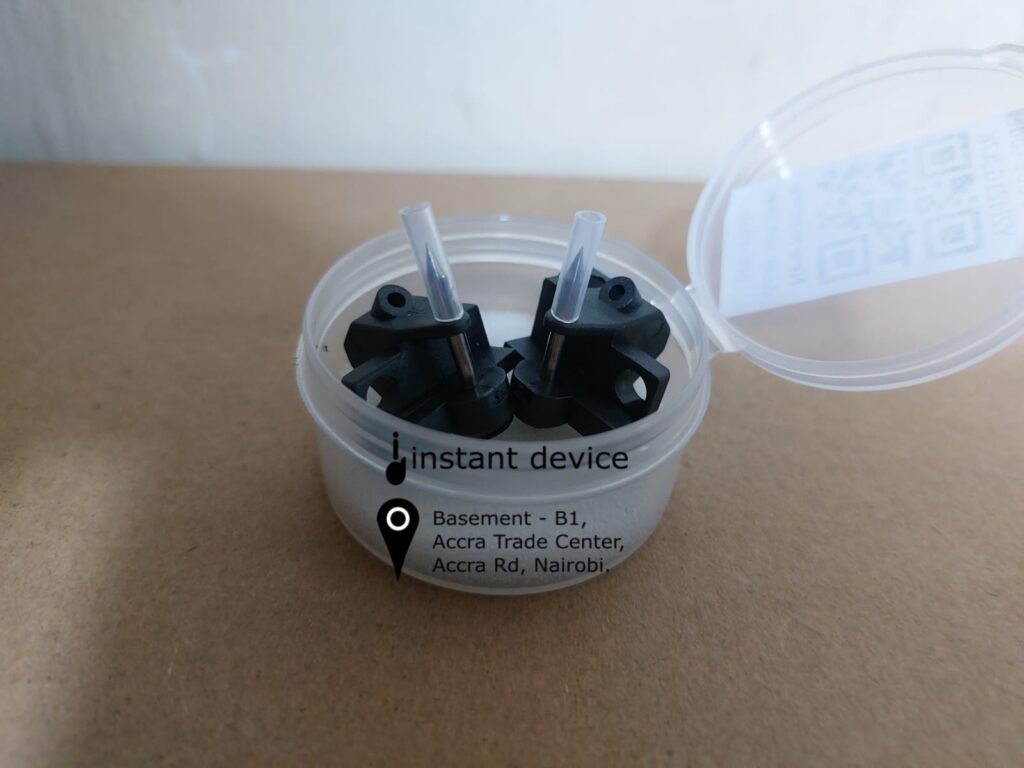
Signal Fire Fusion Splicer Electrodes
Sharing this information in local ISP WhatsApp groups was a game changer.
This single fact, backed by Instant Device stocking replacement electrodes, helped convert skeptics into believers.
Many ISPs started warming up to the idea that owning the AI9 was not just possible, but also sustainable.
From Skepticism to Ownership
Fast-forward from 2023 to today, and the AI9 has gone from a hired tool to an owned asset.
Most ISPs now prefer to buy and keep their own machine, cutting costs and achieving much-needed economies of scale in FTTH deployments.
The numbers speak volumes:
- 2021: Price at KES 150,000 – limited adoption, heavy reliance on hiring.
- 2023: Price eased to KES 130,000 – gradual trust-building phase.
- 2024 – 2025: Price now at KES 85,000 – thanks to rising demand and consistent supply from multiple resellers, making ownership accessible to the smallest ISPs.
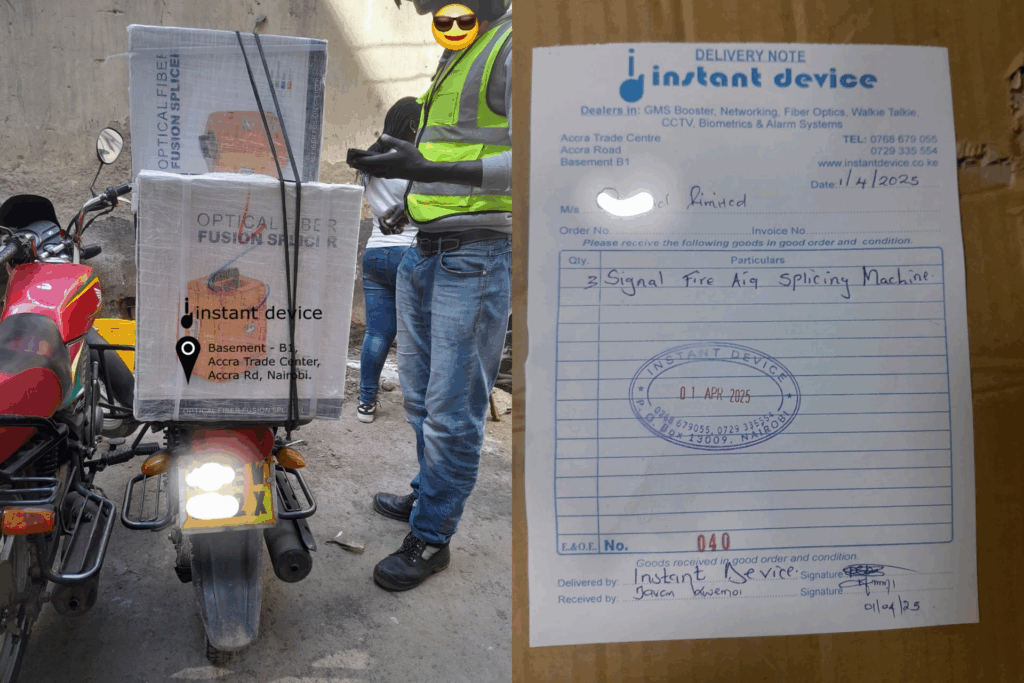
This price evolution, combined with increased market knowledge and availability of spare parts, has made the AI9 one of the most trusted, cost-effective, and widely adopted fusion splicers in Kenya.
Today, Signal Fire is one of the most trusted splicing machines in Kenya, and Instant Device remains a genuine dealer providing not just sales, but also after-sales support, spares, and trusted connections to technicians.
The Bigger Lesson
The journey of the Signal Fire AI9 Fusion Splicer in Kenya shows the power of reliable information, after-sales support, and community-driven learning.
From being “that orange splicer” in 2021 to a trusted ISP workhorse today, its adoption is a story of resilience, collaboration, and trust.
Today, thanks to affordability and better technical support, owning an AI9 is no longer a gamble, but a strategic move that helps ISPs survive and thrive.
And at the center of that story is Instant Device, the genuine dealer that made owning a Signal Fire AI9 not just possible, but practical.
📲 Ready to invest in your own Signal Fire AI9?
Buy now at InstantDevice.co.ke or Call/WhatsApp 0768 679 055 for delivery and support across Kenya.

